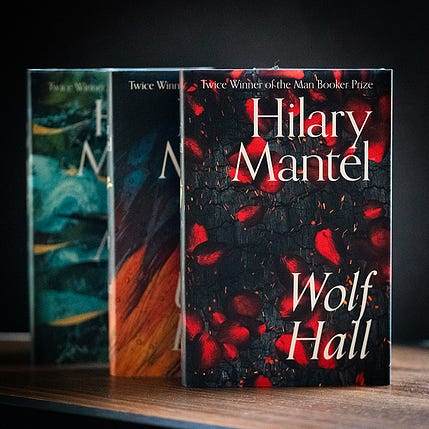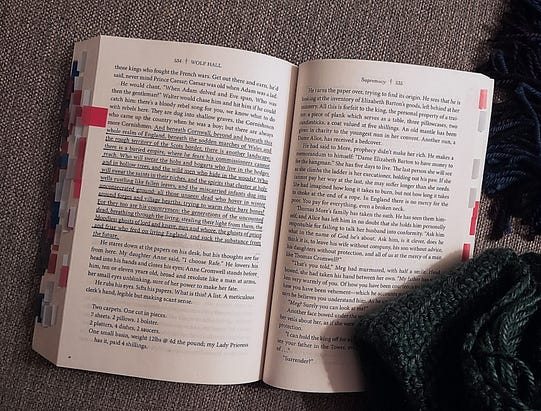You don’t always fall in love with a book the first time you try it. Sometimes, you need to encounter a book when you’re a little older and have a little more life behind you. That’s how it was with me and Wolf Hall. I encountered it for the first time in 2014 or so. I’d heard plenty of buzz about the second book in Hilary Mantel’s Thomas Cromwell trilogy, and all of it was glowing. Everyone loved Bring up the Bodies, and back in 2014 I wasn’t sure what sorts of books I wanted to be reading. I picked up Wolf Hall while browsing at the library, because why not? It was about the Tudors and everyone was raving about it. I bounded off the book within the first chapter. What was with the present tense? What was going on with the perspective? It all felt very strange to me. I didn’t have the reading experience to grasp the kind of story that Mantel was telling me. Wolf Hall never left my mind. It was always there in the background, quietly reminding me that it was there until, five years later, I picked it up again. Reader, I was ready for it this time. I checked out the audiobook from the library and was hooked from the first moment when Simon Vance shouted “So now get up!” at me. I’d never come across historical fiction that made the past come to life so vividly. I was living in the twenty-first century, but somehow I was also living in 1520s England, following Thomas Cromwell around as he rose from being Cardinal Wolsey’s trusted clerk to being at the right hand of Henry VIII. I could see and hear and taste the Tudor era, I smirked at Thurston’s off-color jokes, and cried at the poignant death scenes Mantel conjured out of five-hundred-year-old records. I couldn’t wait to find out what happened next, and when I finished Wolf Hall I picked up Bring Up the Bodies as soon as I possibly could. I listened to that audiobook obsessively, because despite knowing exactly what would happen to Anne Boleyn and the five men who were accused alongside her, reading Mantel’s account of it was like reading about it all for the first time. Then came the wait- not a long one for me, as The Mirror and the Light was set to be released the following March (of 2020), but when you’re looking forward to something as much as I was looking forward to the next book, any wait feels interminable. It was in that interim, I believe, that I first came across Simon’s (@Footnotes and Tangents) book account on Instagram, followed him, and began commenting on his fantastic book reviews and the short stories he posted. When, in January or so of 2020, he suggested a readalong of The Mirror and the Light, I joined right away. It was nothing particularly organized- mostly, it was a handful of Mantel fans chatting about our impressions of the book as we were reading it, in March of 2020 as the covid pandemic began to wash over all of us. I finished the book on a snowy Sunday in April. Instead of devouring it as I usually do with books I’m looking forward to, I’d managed to reign myself in and take it fairly slowly. But on that cold and lonely Sunday afternoon with some 300 pages left, I fell under Mantel’s spell and didn’t stop reading until I came to that final page. When I closed the book, I remember blinking out of my window in confusion. I’d just been in London on a hot summer’s day in 1540. Why was it snowing outside? When I came fully back to the twenty-first century, I grabbed my phone and wrote about it in the group chat. What did I say? Probably something inarticulate, laden with the emotion of the experience I’d just been through. Whatever I said, it was comforting to know that other people were out there, going through the same literary experience I’d just been through. So of course, when Simon announced he was going to do a year-long readalong of the Thomas Cromwell trilogy, I was going to be part of that. I’d already joined in the 2023 War and Peace slow read, though I found that reading just a few pages each day kept me from retaining the information, so I read ahead and finished the book in a relatively breezy four months. The weekly format suited my reading style better, so I committed myself to Wolf Crawl. Was this one of the best bookish choices I’ve ever made? Yes. I read fast. I always have. My twitchy brain rarely allows me to slow down- especially when I’m enjoying a book. Wolf Crawl forced me to slow down in the story without altering my reading habits. Every Sunday afternoon, I would pull out the book and settle down to read the weekly pages, absorb them, and then read Simon’s post about it on Wednesday. Then I’d wait out the rest of the week, the book always on the shelf near my bed, until Sunday rolled around again. As the weeks passed, the passage of story time began to feel as real as the passage of real time. Both January 2024 and 1527 feel like they happened so long ago, now that I’ve finished the book with its ending in 1540 at the end of December 2024. Though this is the fourth time I’ve been through the entire trilogy, it took this reading to notice how thoroughly thread, cloth, and clothing are woven into the narrative, or how much food there is, or how many animals appear. These details I overlooked in my faster readings now feel more critical to the narrative as a whole. They are not so superfluous as I thought, though how I could have thought so in the first place is beyond me. Mantel was a master of her craft. She knew exactly what she was doing when she mentioned the almond cream given to Anne Boleyn, or had Gregory express disappointment in his black greyhounds. Then there’s the revelation that Simon had toward the end of Wolf Crawl: that Thomas Cromwell, the master of memory who knew the New Testament by heart, was not as reliable a narrator as we always thought he was. At the beginning of it all in Wolf Hall, we see Cromwell on his way up in the world. He thinks the best of himself and constantly reminds himself- and us- that he is better than what he was raised to be. He is not Walter. He’s made something of himself. He is a great man and will be greater still if he has his way. Toward the end of The Mirror and the Light, the brilliant tapestry Cromwell has woven about himself begins to unravel. We see childhood memories come back, not tinged with golden light and a blackbird’s song, but stained with Thames mud and the stomping of a boy determined to ruffle the feathers of the upper classes. We’re left to wonder if those events in Wolf Hall happened quite the way Cromwell thinks they did, or if he was trying to remember himself as better than he was. Was he lying to himself, and therefore lying to us as well? The best books stick with you, make you stop and think and reconsider the world you live in, or at least make you reconsider how you look at literature. Wolf Hall, Bring up the Bodies, and The Mirror and the Light have spoiled me, really. Now that I know how electric and how immediate historical fiction can be, it’s hard to find such novels that even begin to measure up. Mantel’s use of language and perspective are nothing short of astonishing. Every time I come back to these books, I find something new to admire about them. To really crack them open, though, I needed a good guide to make me slow down and savor them, to ponder the threads of the tale, and to reconsider pretty much everything I thought I knew about these books. So thank you, Simon, for getting me to not be in such a hurry. Let’s do it all again next year, shall we? Traveling in Books is free today. But if you enjoyed this post, you can tell Traveling in Books that their writing is valuable by pledging a future subscription. You won't be charged unless they enable payments. |
Sunday, 29 December 2024
Wolf Crawl: A Look Back
Subscribe to:
Post Comments (Atom)
Timing is power.
Slow is smooth, and smooth is fast. ...

-
https://advanceinstitute.com.au/2024/04/24/sunnycare-aged-care-week-10/?page_id=...
-
barbaraturneywielandpoetess posted: " life on a rooftop can be short ; depends whether one looks down or up . ...


No comments:
Post a Comment